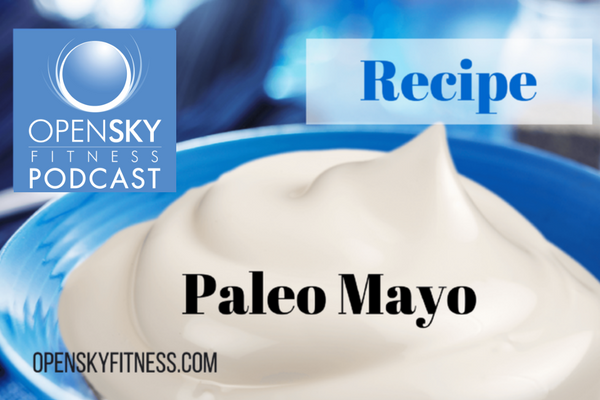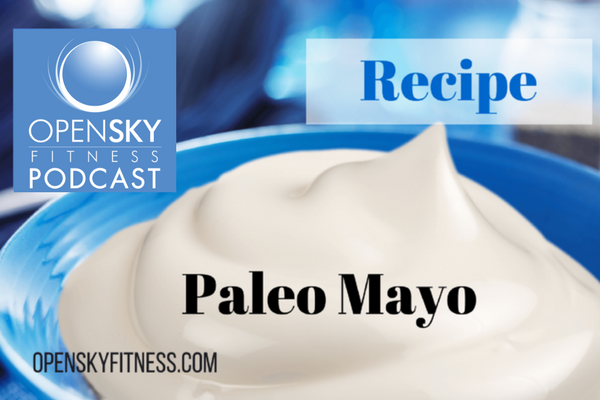Paleo Mayo: Recipe for a Healthy Lifestyle
From an early age we learned that mayonnaise is unhealthy and to consume it only in small amounts. Mayo is “high in fat” and “high in calories,” but does that mean we should never eat it? Hell no! What’s life without mayo?
Well, good news!
While commercially produced mayonnaise isn’t good for us, “Paleo Mayo” is incredibly healthy and it tastes delicious! How is this possible you ask? Let me explain…
Why Paleo Mayo is Healthy
Most people think eating health means eat bland, tasteless food that must be choked down as fast as possible. Rob and I believe you can eat both healthy AND delicious food at the same time.
But why is Paleo Mayo just as tasty as store bought mayo, but way better for you?
It has to do with the healthy fats. This will blow your mind. Well, maybe it won’t blow your mind, but you’ll be cooler for knowing this.
The Omega Fat Ratio
Commercial mayonnaise companies make their products from soybean oil, canola oil, or other vegetables oils. These oils are high Omega 6 fats and are low in Omega 3 fatty acids. A diet too high in Omega 6 fatty acids and too low in Omega 3 fatty acids can cause inflammation in the body.
That’s bad!
A high omega 6, low omega 3 diet is also linked to an increase in inflammatory diseases like obesity, cardiovascular disease, IBS, rheumatoid arthritis, and Alzheimer’s disease. Thus, consuming more omega 3 fatty acids in our diet have anti-inflammatory impacts on our health.
That’s good!
Paleo mayo is made with olive oil and avocado oils. These oils are high in omega 3 and low in omega 6 fatty acids. Thus, paleo mayo helps us achieve a better fatty acid ratio helping our bodies thrive and fight disease
Non-GMO Oils
The oils used in commercial mayonnaise are often made from genetically modified (GMO) crops. Contrary to popular belief, research has NOT shown that GMO’s negatively affect our health. They do, however, impact the health of the environment. Scientist created GMO crops to reduce the amounts of pesticides and herbicides used in the environment while having a larger yield of crops. However, while the amounts of pesticides were reduced in GMO crops in the US, the amount of herbicides used on crops increased. France on the other hand, decrease both herbicides and pesticides on their non-GMO crops.
Also, a study by the New York Times, showed crops did not yield more crops than those countries that did not use GMO seeds. Thus, many of the main points of argument in favor of using GMO crops has been debunked. With this information, we choose to stay away from commercial oils in our paleo mayo. We choose oils with a healthy Omega 6:omega 3 ratio and that are not harmful our bodies or to the environment
Eat Guilt Free!
If you like mayonnaise, fully indulge daily in this healthy paleo mayo recipe guilt free! Feed your family heart healthy fats when using this mayo as a base for salad dressings and ranch dip for buffalo chicken casserole. Spread paleo mayo over your favor deli meat for a delicious chicken/avocado wraps. Support a more sustainable environment by choosing non-GMO oils.
Enjoy your paleo mayo, and keep choosing healthy meals for you and your family.

| Prep Time | 10 |
| Cook Time | 0 |
| Passive Time | 0 |
| Servings |
|
- 3 egg yolks
- 1 1/2 Tbsp white wine vinegar
- 3/4 tsp dijon mustard
- 3/4 Cup olive oil
- 3/4 Cup avocado oil
- 1-2 Tbsp lemon juice (to taste)
- salt and pepper (to taste)
Ingredients
|

|
- In a food processor, process egg yolks, vinegar, and dijon mustard.
- Scrape the sides of the bowl.
- Add 1/4 cup of avocado oil, a few drops at a time, until mixture begins to thicken
- In a slow thin stream add in the the rest of the avocado and olive oils.
- Add in lemon juice to taste.

- Salt and pepper to taste
- Enjoy your healthy mayo!!

If you don't want to make your own paleo mayo, you can go ahead and buy some online. Our favorite is the avocado mayonnaise by Primal Kitchen. We think this tastes the most like the real mayo and has very clean ingredients. We also like the Sir Kensington's avocado mayo, however, this one has some added sugar, which ingredient wise puts it at a close but definite second.

